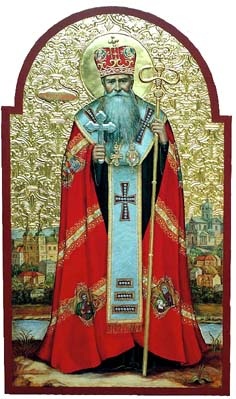
In the years following the promotion to this dignity, Josaphat did not relax in any way his austere mode of living. Nothing was so close to his heart as service to God and the salvation of the flock entrusted to his care. He was a vigorous champion of Catholic unity and truth. He laboured to the utmost of his ability to win back schismatics and heretics to unity with the See of blessed Peter. Both by preaching and writing he defended the Supreme Pontiff and the doctrine of the Pope's plenitude of power. He directed these works, full of piety and learning against most shameful calumnies and the errors of wicked men. Josaphat vindicated episcopal rights and restored ecclesiastical propterty seized by laymen. He won back an incredible number of heretics to the bosom of holy Mother Church. How successfully he laboured to re-establish communion between the Greek and Latin Churches is told in Papal commendations. He gladly spent the revenues set aside for his maintenance to rebuild God's house, to erect convents for consecrated virgins, and to carry on other charitable works. So generous was Josaphat towards the poor that in one instance when he did not have money enough to supply the needs of a certain widow, he pawned his omophorion, that is, his episcopal pallium.
The great progress made by the Catholic faith so stirred up the anger of certain of its wicked enemies that they conspired to murder this athlete of Christ. In a sermon he foretold to his people what was about to happen. As he was setting out for Vitebsk on a pastoral visit, these enemies broke into the episcopal palace, attacking and wounding every one they found. Undaunted, this most kindly man hurried out to the assassins of his own free will and addressed them mildly. My little children, he said, why do ye strike my servants? If ye have any complaint against me, I am here. Thereupon they rushed at him, overwhelmed him with blows and pierced him through with spears. Finally they slew him a stroke of a great axe and threw his body into the river. This happened on November 12th, 1632, when he was forty-three years old. Later his body, surrounded by a marvellous light, was raised from the deepest part of the river. The blood of this Martyr benefited first of all those murderers of their spiritual father. Sentenced to die for their crime, almost all abjured their schism and repented of their crime. Because this wonderful high priest became famous after his death for many miracles, the Supreme Pontiff, Urban VIII, honoured him with the title Blessed. On the 29th of June, 1867, during the solemn observance of the centenaries of the Princes of the Apostles, in the presence of the college of cardinals, of about five hundred others, patriarchs, metropolitans, and bishops of every rite from all parts of the world, assembled in the Vatican basilica, with all solemn ceremonies, Pius IX canonized the first eastern Christian to uphold the unity of the Church. The Supreme Pontiff, Leo XIII, extended his Mass and Office to the universal Church.




